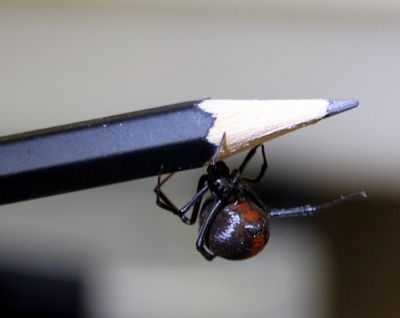Redback spider find at Paparoa ‘no cause for alarm’
8 Dec 2016, 9:37 AM
Officials say there is little risk to the public after the discovery of an Australian redback spider at Paparoa; the first confirmed Northland finding in more than 25 years.
The spider – a mature female Australian redback – was captured by a Paparoa man in his backyard recently and handed into Northland Regional Council staff in Dargaville for identification.
Subsequent tests by the Ministry for Primary Industries (MPI) had confirmed the spider was indeed a redback, which is established in other parts of New Zealand, and experts believed the North specimen had originated from one of those existing populations.
Local health officials say the redback’s discovery poses a low risk to public health, but have alerted hospital emergency department staff to the possibility of people ‘presenting with spider bites’.
Don McKenzie, the Northland Regional Council’s Biosecurity Manager, says the larger female spiders are responsible for almost all cases of redbacks biting humans, although it’s rare for them to do so and usually only happens if they are disturbed or trapped in clothing.
 The redback with a pencil for scale. Its distinctive markings can be seen on the underside of its hour-glass shaped abdomen.
The redback with a pencil for scale. Its distinctive markings can be seen on the underside of its hour-glass shaped abdomen.
While bites could be painful, there had been no recorded deaths attributed to a redback bite anywhere in Australasia since the development of an anti-venom more than 50 years ago.
Mr McKenzie says the regional council’s role with redbacks is limited to any biosecurity risks they might pose.
“However, we think it’s a common sense to point out – to Kaipara residents in particular – that given this discovery they might like to take a little bit extra care when working in and around sand dunes, under old logs, and in back yards, as the spider can hide under garden implements and sheds.”
Redbacks typically conceal themselves in dark, dry, sheltered spaces and are most active in the late afternoon and evening.
They can be distinguished by an orangey/red strip running down their back and a distinctive red ‘hour glass’ shape on the bottom of their abdomen.
“The bite reportedly causes a sharp pain similar to a pinprick and may lead to localised redness, pain and sweating.”
Occasionally the pain and sweating may spread and stomach pain may occur. Aches in muscles and joints, nausea and vomiting, and increased heart rate and blood pressure can also result.
Mr McKenzie says anyone who thinks they may have been bitten by a redback should seek urgent medical treatment.
“This is a very rare find, but if anyone else in Northland does find or suspect a spider is a redback you can call MPI on their pest and disease hot line (0800 80 99 66).”
